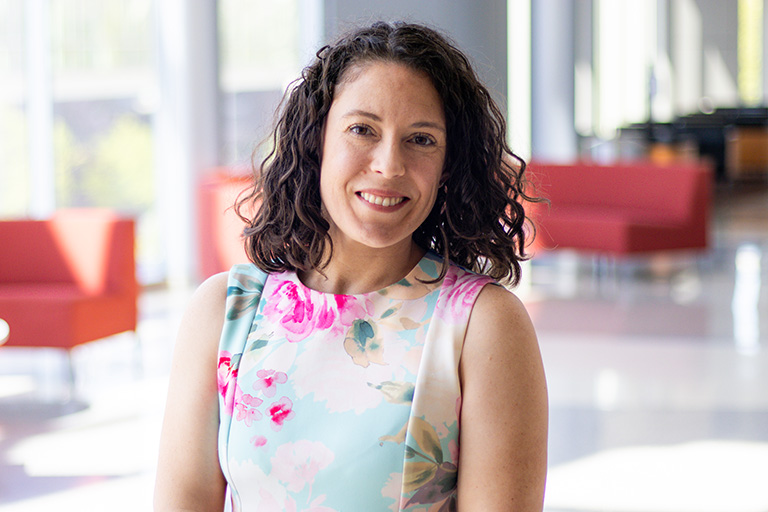By: IU Simon Comprehensive Cancer Center
April 23, 2024
Q&A: Utilizing the Oncology Research Information Exchange Network (ORIEN)

The IU Simon Comprehensive Cancer Center is a member of the Oncology Research Information Exchange Network (ORIEN), a partnership of cancer centers that enables members to collaborate on clinical research through shared data contributions. The cancer center joined the network in 2018.
Emily Nelson is the data and regulatory team manager and ORIEN program manager for the cancer center’s Biospecimen Collection and Banking Core (BC2). Nelson answers questions about ORIEN.
What is ORIEN and how can it benefit cancer center researchers?
ORIEN, managed by Aster Insights, is an attempt to break down some of the silos between cancer centers to enable a robust collaboration around cancer research. Through this partnership, we have agreed to contribute data and biospecimens to generate a shared resource across the consortium. The ORIEN Avatar project enables investigators to access clinico-genomic data from more than 27,000 individuals for cancer discovery.
What is the ORIEN Avatar program, and how do researchers utilize that resource?
The ORIEN Avatar program is the most robust data resource that has been generated within the consortium. Each participating institution identifies qualifying patients and sends a germline and somatic sample to generate whole exome sequencing (tumor/germline) and RNA sequencing (tumor only). This is paired with longitudinal clinical data for each participant. With more than 27,000 patients represented in this data resource, there is significant depth and breadth to support a variety of research questions.
What are some examples of how investigators use ORIEN?
There is a variety of ways that scientists can use the ORIEN resource. Many of our scientist partners are interested in using the ORIEN Avatar data resources to perform their work. We support them in submitting a project proposal to the network and gaining access to the data. While this is the traditional use case, there are other strategic ways our scientists have successfully leveraged this opportunity.
Tim Lautenschlaeger, M.D., (EDT), has partnered with BC2 to collect samples that are sent directly to his lab at the time of collection and pair those samples with genomic data generated through ORIEN Avatar. This allows him to obtain the genomic sequencing at no cost.
Melissa Fishel, Ph.D., (TMM), and the Pancreatic Cancer Working Group took a cohort of patients with pancreatic cancer and submitted as many as possible for ORIEN Avatar sequencing. These samples and others were incorporated into a Tissue Micro Array (TMA) to allow the clinico-genomic data generated through ORIEN Avatar to be paired with staining information from the samples.
In another possible avenue of use, Jing Su, Ph.D., (TMM), has taken the cohort of genomic data generated in ORIEN Avatar and worked on structuring this information into the Indiana Precision Oncology Common Data Model.
How does the ORIEN Total Cancer Care study fit into this program?
The Total Cancer Care protocol is the backbone of the ORIEN collaboration. Every institution within ORIEN consents patients to participate in a biobanking protocol with clinical data capture. At the IU Simon Comprehensive Cancer Center, Total Cancer Care is our institutional biobanking protocol that we use to partner with patients throughout the cancer center and invite them to donate their health information and biospecimens in support of cancer research. More than 20,000 individuals have been enrolled at the IU Simon Comprehensive Cancer Center through direct consent or a legacy biobanking protocol consent.
What benefit does ORIEN Total Cancer Care have for patients?
Our patients who choose to participate may not receive any direct benefit. They are partnering with us to help ensure a better future for cancer care.
How does a researcher access these ORIEN resources?
Researchers have the opportunity to begin reviewing the data available in Avatar by requesting access to the closed instance of cBioPortal through our institutional ORIEN Program Managers (OPMs), Heather Penwell (helander@iu.edu) and myself (emgood@iu.edu).
Once scientists determine that they would like to conduct a project using the resource, they engage in a feasibility assessment led by our OPMs. For projects that are deemed feasible, OPMs partner with scientists to compile and submit to ORIEN all the necessary information for the regulatory review and proposal. Scientists have the opportunity to share with the ORIEN Scientific Committee to get feedback on their project proposal. Afterwards, ORIEN participating sites are engaged to assess their willingness to contribute data for a given project. After approvals, Aster Insights cuts a cohort of data and provisions it to scientists to do their work. From project proposal to the network to receipt of data, it typically takes about two months.




